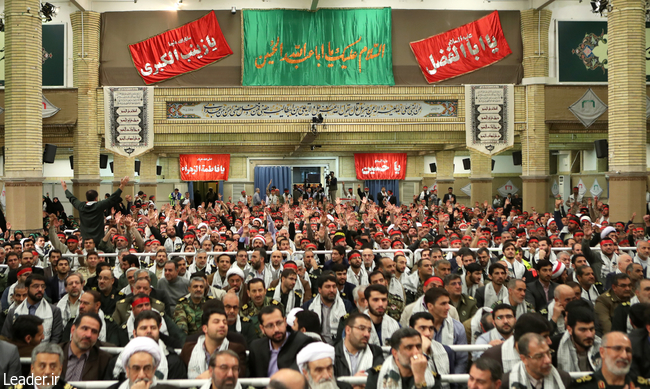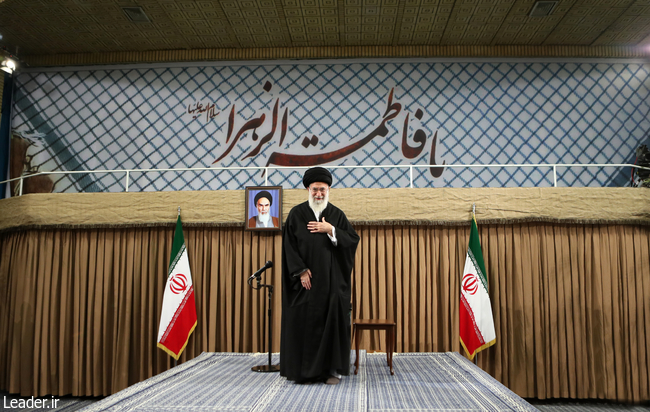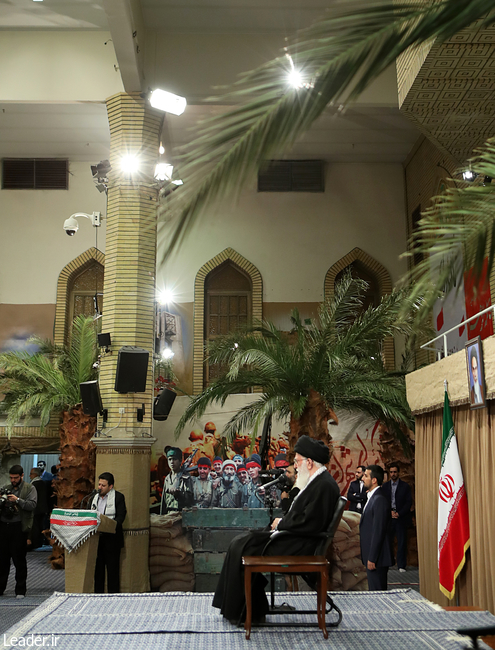Leader of the Islamic Revolution Ayatollah Seyyed Ali Khamenei met with a group of officials in charge of Rahian-e-Nour pilgrimage tours-which take people on visits to former war theaters related to the eight-year Iraqi imposed war on Iran-as well as a group of veteran commanders and combatants of that war on Monday. During the meeting, the Leader described the eight-year period of the Iraqi imposed war on Iran, which is known as the Sacred Defense among Iranians, as one of the pure and valuable cultural riches of the country. Emphasizing that organizing Rahian-e-Nour tours was a very great and important initiative and a modern technology used to tap into the Sacred Defense as a wealth and a gold mine for the nation, Ayatollah Seyyed Ali Khamenei added, “The sole way to counter cultural plots of ill-wishers is cultural production and taking advantage of the rich wealth and the powerful origins of the Sacred Defense period in all fields.”
The Leader of the Islamic Revolution thanked officials in charge of Rahian-e-Nour pilgrimage tours, and while pointing to the emphasis put by the Almighty God in the Holy Quran on the need to remind people of “holy days” and great and influential days, described the period of the Sacred Defense as an instance of those holy and historic days of the Iranian nation. The Leader added, “The Sacred Defense and its lessons must by no means be allowed to slip into oblivion.”
Ayatollah Khamenei described Rahian-e-Nour as a factor that prevents values and lessons of the Sacred Defense period from being forgotten and noted, “In order for any work to make progress and be uplifted [qualitatively] it must be safeguarded continuously so as to prevent that work from deviating from the correct path.” The Leader then added, “Of course, progress and upliftment are not possible through mere lip service and presentation of statistics, but the product and result of that work must be seen on the ground.”
The Leader then pointed to the natural and human riches of various nations and countries and said, “The Iranian nation and country enjoys an abundance of natural and human riches and strengths, but one of the most important of those riches and cultural values is [presence of] ‘the spirit of believing in struggle [on the path of God] and having motivation to move on the path of religion’ among the majority of people.”
The Leader of the Islamic Revolution added, “‘Believing in resistance against bullies’ as well as believing that ‘if we resist, we will undoubtedly overcome the enemy’, are among other riches and cultural values of the Iranian nation, which if kept alive and brought into the arena, will lead to great steps like what happened in the course of the victory of the Islamic Revolution and during the period of the Sacred Defense.”
Ayatollah Khamenei then turned to a key point about the Iraqi imposed war against Iran, saying, “The reason behind the start of the imposed war was that the Baathist enemy and its supporters sensed some weakness in us and if they were not sure about [the possibility of] conquering Tehran in a few days, they would not have certainly initiated the war.”
The Leader then emphasized, “This is a general rule that ‘feeling of weakness will encourage the enemy to attack’. Therefore, if we want to make the enemy change its mind about aggression, we must avoid expressing weakness and reveal numerous strengths that we have.”
The Leader of the Islamic Revolution emphasized that this general rule also applies to all cultural and economic fields, adding, “The mistake made by some people with regard to the big economic challenge with which the country is currently grappling was to show weakness in the field of economy and the enemy found that this is where it can put pressure [on the Iranian nation] and did mount pressure [on the country].”
The Leader then went back to the issue of the Sacred Defense period and posed this question, “Was Iran really weak at the beginning of the war?” Ayatollah Khamenei then explained the country’s conditions at that time and pointed out, “At the beginning of the war, Iran was really weak, because a consolidated and orderly military force as well as adequate [military] equipment were lacking and some of the equipment were still unknown [to the Iranian military], and more importantly, the Iranian nation had no experience of war up to that time.”
The Leader of the Islamic Revolution said, “The result of the conditions that prevailed at that time was that the enemy advanced up to about 12 kilometers of [the southwestern city of] Ahvaz. However, after the loud cry of the honorable Imam [Khomeini], which was among the miracles of the time and one of the great divine signs, Muslim and revolutionary forces, including the Army, the IRGC [Islamic Revolution Guards Corps], and the Basij [force] entered the arena [of war] and while taking advantage of the existing potentialities, made good use of their strengths, such as management and organization and initiative, and could change the theater of war through their faith and bravery.”
Referring to the short time interval of one and a half years from September 1980 [when the imposed war started] to April 1982, the Leader said, “During that period, faithful and revolutionary forces managed to turn the enemy’s advance to the close vicinity of Ahvaz into Operation Fath-ol-Mobin [Evident Triumph] and capture of about 12,000 enemy forces, and this is a great and valuable wealth for all times.”
The Leader of the Islamic Revolution then took to task all people and political currents that are trying to downplay the value of the Sacred Defense period in the society or talk against it, adding, “These people are like those, who set fire to precious manuscripts of a nation or pour into the sea a nation’s oil wealth.”
Ayatollah Khamenei then drew an analogy between inattention to the period of Sacred Defense or moving opposite to it and destroying the national, historical wealth of a nation and stressed, “Officials must be watchful in this regard and not allow any movie or book or other material be produced against the values and huge treasure trove of the Sacred Defense.”
The Leader explained that some people confuse two issues, adding, “There is no doubt that war is violent and devastating, but the important question is what would happen if a nation is invaded, but does not bring its power and force into the arena?”
The Leader of the Islamic Revolution said, “The period of the Sacred Defense was, in fact, a vital issue and like taking a breath for the Iranian nation, and if this breath had not been taken, the nation would have died.”
Ayatollah Khamenei described numerous, meaningful, and expressive memories of the Sacred Defense period as a huge and national wealth and noted, “That combatant from [the Iranian city of] Hamedan, who was not over 20 years old during the Sacred Defense period, teaches us through his memoirs that ‘if you want to cross a barbed-wire barrier, you must first cross the barbed wire of your carnal desires’. This means that as long as we are entangled in ourselves, we cannot do anything [effective].”
The Leader then emphasized that technology is needed to take advantage of any wealth and treasure, adding, “[Organizing] Rahian-e-Nour [tours] is, in fact, the technology [which is needed] to take advantage of the huge wealth and gold mine of the Sacred Defense period.”
Ayatollah Khamenei underlined the need for taking advantage of the rich content of the Sacred Defense in school and university textbooks as well as in the works of art, noting, “Officials, especially officials of the administration and universities, must consider themselves duty-bound to do this.”
The Leader of the Islamic Revolution also advised officials in charge of Rahian-e-Nour tours to make plans in such a way that when those who visit operational theaters of the Sacred Defense return to their homes, they would have developed an unbreakable connection with this important event and its values.
Ayatollah Khamenei then underlined the necessity of promoting books and the culture of the Sacred Defense in various art formats, and while emphasizing the need to appreciate the value of veterans and commanders of the Sacred Defense, said, “If there is continued cultural work and cultural production with regard to the Sacred Defense, the country would be made strong in the face of cultural plans and plots [by the enemies].”
The Leader then stated that having cultural strength was requisite for getting strong in the fields of economy and politics as well. Reiterating that the period of the Sacred Defense was the origin of the country’s cultural strength, Ayatollah Khamenei added, “Culture is like economy and if we have no production in the field of culture, we would need imports and the outcome of such imports would be ‘the inability of domestic production to stand on its own feet’.”
Elsewhere in his remarks, the Leader of the Islamic Revolution pointed to some economic problems facing the country and noted, “At the present time, one of the country’s problems is high-volume and, to some extent, inorderly imports as opposed to incomplete domestic production.”
Ayatollah Khamenei noted that the outcome of low production of cultural goods was official imports as well as smuggling in the cultural sector, adding, “At the present time, the volume of cultural imports is high and all these [imported material] are in line with the enemies’ plans to change the young generation from a generation that loves the revolution and the Imam and values, to an element dependent on a Western culture, which is useless for the country.”
The Leader then stated that cultural plans [made by the enemies] were more dangerous than security conspiracies and even a military threat and added, “The military move taken by the enemy makes the nation stronger and more consolidated, but the cultural onslaught weakens [people’s] resolves and robs the country of its young generation.”
The Leader of the Islamic Revolution wrapped up his remarks by giving a recommendation to reporters and those who narrate memories of the war during Rahian-e-Nour tours.
Ayatollah Khamenei said, “Reporting for Rahian-e-Nour is very different from reporting for ordinary tourists, because when it comes to Rahian-e-Nour, the content must be full of elucidation and explanation of facts, knowledge and prominent milestones of the Sacred Defense period.”
The Leader then pointed out, “Of course, this does not mean exaggerating about the Sacred Defense, but the difficulties [of war] and some failures must be explained in parallel to achievements and numerous strengths of the Sacred Defense period.”
The Leader of the Islamic Revolution said, “Elucidating the facts about the Sacred Defense will lay bare the luminescence of pure human beings and the martyrs of the Sacred Defense.”
Ayatollah Khamenei also mentioned the Iranian provinces of Khuzestan, Ilam, Kermanshah, Kordestan, and West Azarbaijan as five provinces that are major destinations of Rahian-e-Nour expeditions, noting, “Each of these provinces has its own value and position, something which must be explained to the visitors. In the meantime, people of these provinces must be paid [necessary] attention and supported, because if it were not for the support provided [to war fronts] by people in these provinces, the war would have stalled.”
Before the remarks by the Leader of the Islamic Revolution, Major General Mohammad Baqeri, Chairman of the Joint Chiefs of Staff of Iranian Armed Forces, presented a report, in which he said 57 memorial monuments related to Rahian-e-Nour tours have been made operational from the country’s northwest down to the Persian Gulf and Makran coasts. He added, “Rahian-e-Nour, as a unique example of uplifting tourism, is not only capable of preserving the identity of the Islamic Revolution and the Sacred Defense and preventing eight years of struggles by the Iranian people from being distorted and forgotten, but is also able to play an effective role in preserving cultural and social forms of sustainable security.”
Major General Baqeri also pointed to measures taken to promote a pilgrimage that is combined with knowledge to war theaters and introduce the outstanding milestones of the Sacred Defense. He added, “There are a total of 10 active operational posts within the central headquarters of Rahian-e-Nour, which provide services to six million Rahian-e-Nour pilgrims through 150,000 custodians, preachers, narrators and other executive staff.”
Chairman of the Joint Chiefs of Staff of Iranian Armed Forces stressed, “We, soldiers of the Islamic Revolution, who believe in the fundamental nature of the hostility of enemies, especially the criminal America, are of the opinion that the enemy is now in its weakest position and Rahian-e-Nour can be influential in the cultural battlefield thanks to its jihadi way of thinking.”



